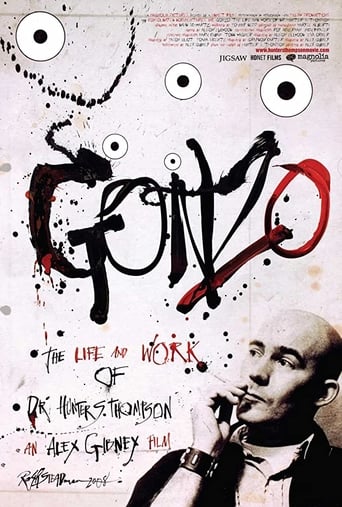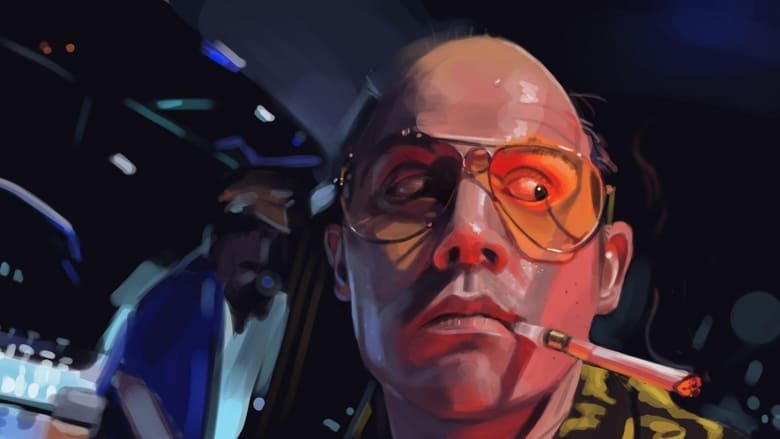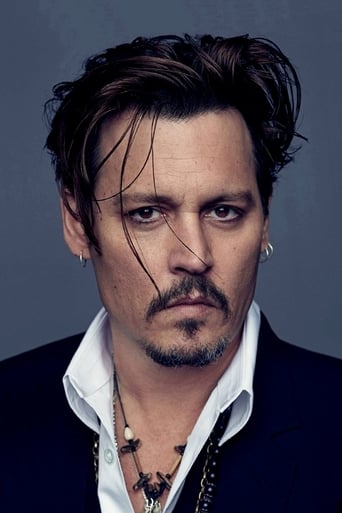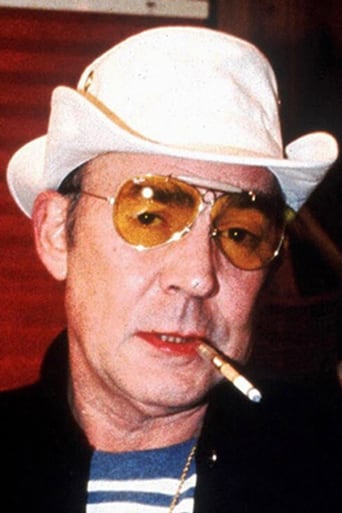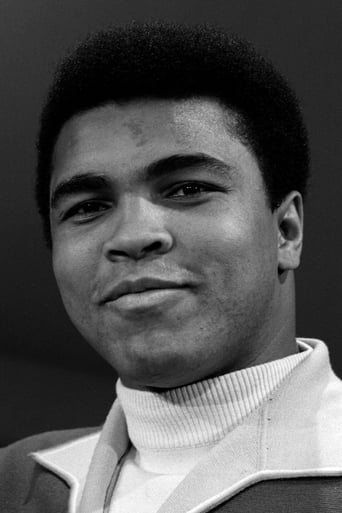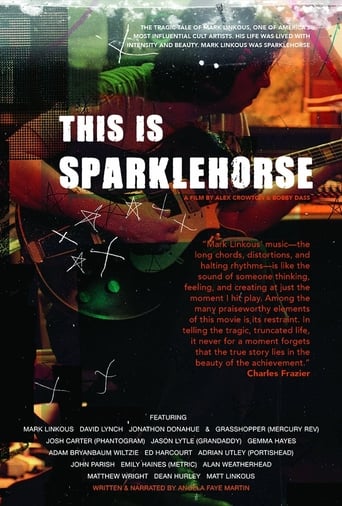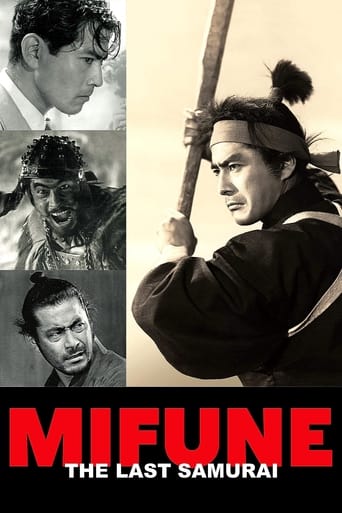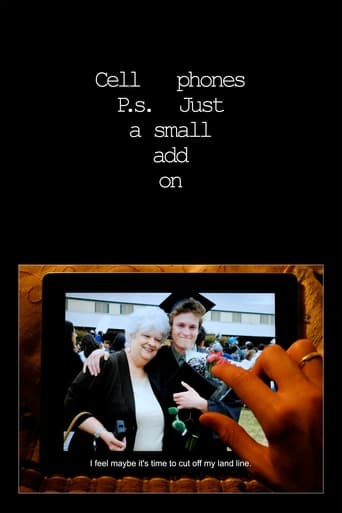Gonzo: The Life and Work of Dr. Hunter S. Thompson (2008)
Fueled by a raging libido, Wild Turkey, and superhuman doses of drugs, Thompson was a true "free lance, " goring sacred cows with impunity, hilarity, and a steel-eyed conviction for writing wrongs. Focusing on the good doctor's heyday, 1965 to 1975, the film includes clips of never-before-seen (nor heard) home movies, audiotapes, and passages from unpublished manuscripts.
Watch Trailer
Free Trial Channels
Cast


Similar titles
Reviews
Excellent but underrated film
It's entirely possible that sending the audience out feeling lousy was intentional
It is both painfully honest and laugh-out-loud funny at the same time.
This is a coming of age storyline that you've seen in one form or another for decades. It takes a truly unique voice to make yet another one worth watching.
Hunter Thompson's gift was to fall gracefully into chaos. He didn't always do well in this, and rarely do movies that reference him in any way.You can only approach this world of righteous anarchy in one of two ways. You can stand outside it and draw it as informed disorder, or you can try to go with the flow scribbling blind, surfing unseen cultural fields that you make visible. Only Gilliam with Depp has been able to dissolve Gonzo with value. All else who try fall off their skateboards.This takes the other route: straight interviews and archival footage, assembled as if it really could say something about what happened. The result is so off the mark that it flattens a whole era, erases the very spidery traces that Thompson teased into visibility. This is a film that destroys its subject because of a vast misunderstanding. It is easy to do, since the man himself was too doltish to know what he did when it worked.Ted's Evaluation -- 1 of 3: You can find something better to do with this part of your life.
Gonzo is a traditional documentary in which the director remains mute behind the camera, allowing the subjects to develop the story independent of outside commentary. The film's foundation is its subject matter--not the fireworks of post-Michael-Moore documentary film making.If you're into the Hell's Angels, drug culture, gun culture, psychological and sometimes real violence, the 60s, the 70s, Ken Kesey and the Merry Pranksters, Tom Wolfe, Neal Cassidy, Rolling Stone, Haight-Ashbury, and, most importantly Hunter S. Thompson (aka Raoul Duke) himself--if you're into that kind of thing--this film will work for you.I am into that kind of thing--but mostly because I'm intellectually fascinated by the prototypes of many of the people I've chosen to surround myself with now. You have to understand that a film like this is sort of about my imaginary ancestors. Or maybe the imaginary ancestors of a family I've loosely adopted as my own.I'm a seven-time participant in Burning Man. The people I know (whether they admit it or not), are still carrying the torch for pranksterism and hippydom. And if I wasn't so square myself, I'd probably be even deeper in the middle of what the counterculture has become. I appreciate tranquility and sanity too much to be more than a voyeuristic observer in this experiment. It's not dead quite yet, believe me.About that intellectual curiosity: I've never really been able to tease apart my ambivalent feelings towards Hunter S. Thompson. I've read Hell's Angels, seen Johnny Depp in Fear and Loathing in Las Vegas, seen Bill Murray in Where the Buffalo roam. I admire Thompson's success and enjoy his writing.But on the other hand, my admiration is tainted by a small part of something negative--maybe disgust or distrust, or maybe just spiteful envy that someone could become so successful primarily by flaunting moral and journalistic convention.The movie helped me see the man more than the character--and I have a much deeper appreciation for his experience of reality: for Hunter's experience, and what it led him to do. I don't know that the film resolved my ambivalence, but it certainly helped me not to be quite so judgmental.What fascinates me the most about this era is not the traditional narrative that pits the authority against the counter-cultural freaks. What continues to fascinate me is the way in which the so-called 'failure' of the era was really just the final, incontrovertible admission that the counterculture was another facet of the mainstream culture, and that there were easy ways in which the latter could bend itself into an acceptable version of the former.In today's context, it's nearly unthinkable to me that a person like Thompson could not only make a living but really be quite successful by adopting outrageousness and rebellion for its own sake.Somehow, even then, when long-haired (or bald-headed in Thompson's case) rock-infused freakiness was still too nascent to have found its way into the stripmall mainstream, there were people who managed to make money off of the system while mouthing off about it at every opportunity.And maybe that's what made the movement so absolutely enticing as a force of social revolt: because it had the money to make revolution not just a moral imperative, but also really really fun.For all of its outsider mentality and oppression complex, the counterculture was still white, still disproportionately privileged, still more capable of wielding its resources to create a reality other than the one presented to its members at birth.It remains to be seen whether that's something we should really feel ashamed of, or whether it's just a good thing to keep in mind as we launch our future projects as DIY culture-builders.The ability to reshape one's cultural reality without drastically impacting one's economic future is, arguably, the greatest privilege we whites have maintained over time. I truly wish everyone could experience that kind of freedom.Hunter S. Thompson personifies the problem of white outsiderness to me. He was the bad boy and people with money liked the spectacle. Didn't seem like he felt any pressure to assimilate.Because ultimately he was producing more (social and material) capital than the suits and minor politicians he ridiculed. Was he really any more pure of the taint of money and privilege than they were, or was he just smarter about it? Should I despise him for his fame and spectacle, or should I feel proud that some one made it while saying no to that stereotypical straw man we call normal? Like a lot of author bios this film brought a third dimension to Thompson--one I hadn't seen before. By listening to his struggles and the accounts of his friends, I learned who Hunter was beyond what he has come to represent in my head.
No holds barred documentary covering the bizarre life of Dr. Hunter S. Thompson - the father of Gonzo journalism. This film covers all his classic moments:Hell's Angels, Race for Sheriff of Aspen, Fear and Loathing in Las Vegas and on the Campaign Trail; Muhammad Ali vs. George Foreman, George McGovern, Jimmy Carter, etc. The articles he wrote over several decades for Rolling Stone Magazine are given heavy perspective and no one represented the voice of the turbulent 60's and 70's like Hunter aka Raoul Drake.Great soundtrack, clips & guest from Johnny Depp to Jimmy Buffett. The loss of a great voice we could really use today!
I saw this inserted in a festival. Festivals are great occasions. There is a mood in the air, which invites us to see new things, ambitious ones. Most of the time, it must be said, i see failures, some glorious, others pure crap. But the possibility to see new surprise life altering creations compensates for all the eventually boring proofs we might have to endure. This little documentary is something of an exception in these types i described.As a film in itself it has little value. It's a collection of photographs, testimonies, old videos and testimonies made for the documentary, with a plus, Johnny Depp narrating Thompson. It is tailored like the serial documentaries the Discovery or History channel usually makes. But i actually enjoyed it. For one reason, i was ignorant about many of the aspects in his life, namely the politic involvements, which is a contradiction, among others, in the life of a counter-culture icon.Anyway, it's the very facts of Thompson's life that move the whole thing, and sparks the whole interest this may have. Because there was something that displeased me, a kind of formal contradiction which nevertheless is fun to find: H.Thompson was important as a writer, fundamentally because he broke forms, and in the process created a genre on its own. His kind of writing is essentially visual, which means it's also potentially cinematic - Gillian understood this, but in 'Fear and Loathing...' he was either to literal in his interpretation, or to attached to his own vision, so though he made a good piece, he was not fully faithful to Thompson. The visual quality of his writings can be tested in this documentary, whenever Depp reads. It's powerful, and probably more effective than any of the footage used. There lies the contradiction. The documentary is vulgar, it uses a worn out formula for serial documentaries, equivalents to the kind of dull journalistic writing Thompson wanted to evade. See my point?So, probably, Hunter will last for what he wrote, not for what he 'was'. After all, it's not uncommon or specially thrilling the kind of things he effectively did. Though that provided most of the juice and energy he puts in his writings, it's not the orgies, or the guns, or the acids that make his life worth knowing.Nevertheless, Thompson would perfectly incarnate the mood of a film festival. That's a complement.My opinion: 3/5 http://www.7eyes.wordpress.com

